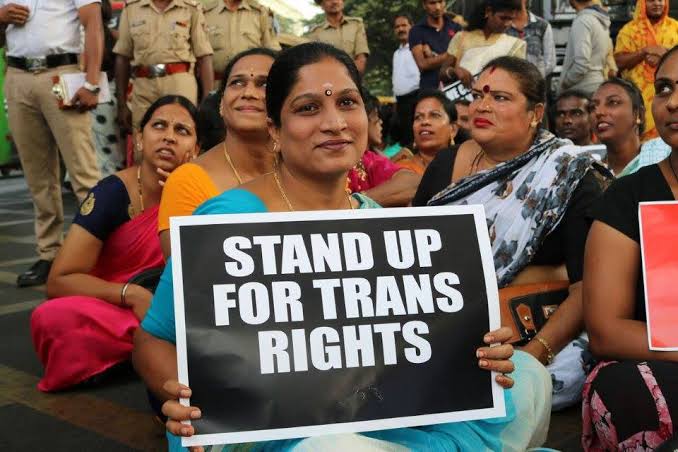
Low crime rate reports for transgender community due to lack of documentation of transgender persons in paper, leads to distorted crime records against the community.
The National Crime Records Bureau (NCRB) recorded 236 victims (or 0.006% of all crime victims) who were transgender persons in 2020 and registered no cases of rape, buying and selling of minors for prostitution in which trans persons were victims, according to IndiaSpend newsportal.
In 2014, in the case filed by the National Legal Services Authority of India (NALSA), the Supreme Court said that a person’s gender would not be based on their biological sex but on how they identify.
Yet, “even after 2014, a very small percentage [of transgender persons] has had their certificates made or documents updated,” said queer rights activist, Philip C. Philip to the news portal. “So, when any crime happens the police end up looking at a document with a binary marker. That is the reason the recorded numbers are so low for crimes against the transgender community.”
Now, under the Transgender Persons (Protection of Rights) Act, 2019, a District Magistrate should issue a Certificate of Identity, recognising a person as transgender.
“The Act states that a person recognised as transgender shall have a right to self-perceived gender identity and at the same time requires a transgender person to make an application to the District Magistrate for issuing a certificate of identity as a transgender person. The Act is self-contradictory and gives too much power to an entity to decide what a person’s gender is,” India Spend quotes advocate Oindrila Sen, who formerly worked with the Human Rights Law Network in New Delhi as saying.
Of 9,064 applications received to issue a transgender certificate and ID card, 1,995 (22%) are pending and 1,164 (13%) have been declared ‘not-eligible’, as per data from the National portal for transgender persons, as of June 20, 2022. As against this, India has nearly 488,000 transgender persons, as per the 2011 Census.
Clearly indicating the disparity in the total number of transgender persons and the minimum average number of applications received and sanctioned by the authorities.
Of 1,995 pending applications, 331 (16.5%) of the applications have been pending for 7-12 months, even as the Act mandates that district authorities issue transgender certificates & ID cards within 30 days of receiving an application.
A transgender person needs this certificate to invoke rights such as rights of residence, non-discrimination in employment under the the 2019 Act, and the lack of a gender identity certificate hinders access to legal recourse.
The lack of documentation also means trangender persons cannot benefit from the government’s welfare schemes and other social security benefits, IndiaSpend had reported in June 2021. IndiaSpend in this regard has written to the Ministry of Social Justice and Empowerment on the delays in issuing certificates, and the challenges in applying for certificates.
The already marginalised community finds it a hurdle to procure documents from the government or place their grievances due to lack of awareness of their rights and welfare schemes of the government stemming from lack of resources for Trans persons.
The lack of penal provision to protect transgenders from rape denies the victims right to justice and infuelling the number of ciminals who perpetuates the crime without facing any punishment.Largely,adding to the existent vulnerability of the community against the society.
“We handled a case where a trans woman was the victim of sexual harassment but the police refused to register her complaint. They insisted that section 354A of IPC [Indian Penal Code, the section against sexual harassment] does not include a trans woman as a victim,” Tripti Tandon, a trangender persons’ rights lawyer said to India Spend. “The complaint was registered only after we approached the Delhi High Court.”
“Our laws and policies must also be made gender-neutral and The Transgender Persons (Protection of Rights) Act, 2019 should be revised,” adds Kiran.
According to Hyderabad-based transgender activist Rachana Mudraboyina, NCRB records show a decrease in crime records against the community since 2016, which refutes ground reality.
Also there is the underlying issue of structurally classifying cases against transgender people as suicides and accidents vs what actually took place, she said to Maktoob. After much debate, the FIR system of registering cases under the title ‘Eunuch,’ a derogatory term used for the community, was changed to transgender. The records are disrupted as a result of these issues.
She points out that following the 2014 Court Ruling, cases are now being reported but not depicted in NCRB records.
Positively, the transgender victims are given support through the Transgender Hyderabad Helpdesk and Pride Place at Women’s Safety Wing,however they have not made much headway in this aspect. She also explains how the RTI records exclusively list transgender people as criminals, ignoring the crimes committed against them.
Mudraboyina further adds that there should be authenticated records of crimes committed by and against the community.
“Police should be sincere in reporting the crimes, and only if NCRB records depict the actual numbers public would also be aware of the crimes happening against them”, she said to Maktoob.
Huda Ayisha is a student of Kirori Mal College Delhi University and en editorial intern at Maktoob.



